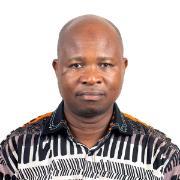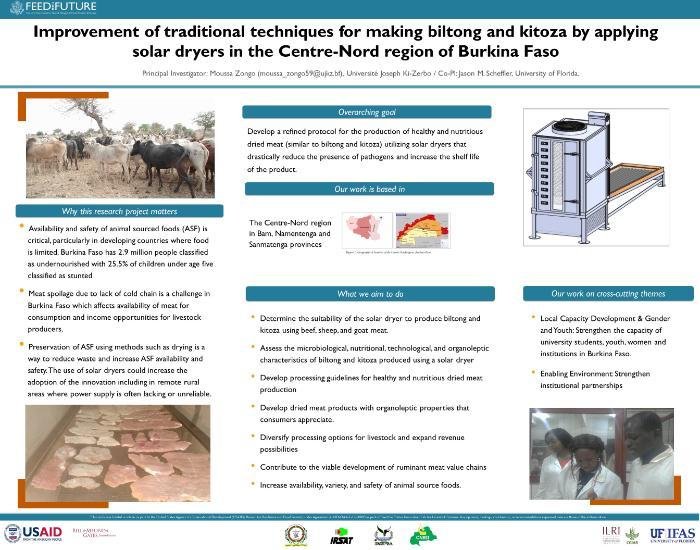Improvement of Traditional Techniques for Making Biltong and Kitoza by Applying Solar Dryers in Centre Nord of Burkina Faso
- Research Project Location: Burkina Faso
- Timeframe: June 2024 - August 2025 (Terminated in February 2025)
- Funding: USAID
Introduction
The availability and safety of animal-source foods (ASF) is particularly critical in developing countries where food is limited. Burkina Faso has 2.9 million people classified as undernourished, with one-quarter of children under age five classified as stunted.
Preservation of ASF using methods such as drying is a way to reduce waste and increase ASF availability and safety. In Africa, there are few processing guidelines for dried meat production, and therefore the industry uses different processing parameters, which results in variation in the product.
Project Goal and Objectives
This project aimed to develop, in the context of Burkina Faso, a refined protocol for the production of healthy and nutritious dried meat (similar to biltong and kitoza) using solar driers that drastically reduce pathogens and increase the shelf life of the product.
The objectives of the project were to:
- Determine the suitability of the solar dryer to produce biltong and kitoza using beef, sheep, and goat meat
- Assess the microbiological, nutritional, technological, and organoleptic characteristics of biltong and kitoza produced by solar dryer
- Encourage the adoption of solar meat drying technology among women and youth in the Centre Nord
Research Approach
For processing, beef, sheep, and goat portions will be sliced along the muscle fibers and marinated using local ingredients. Biltong and kitoza will then be dried using solar driers at fixed and controlled temperatures until they lose 80% of their weight. We will determine the physicochemical and microbiological parameters and acceptability of the product. The rate and extent of inactivation of the pathogens Salmonella, E coli O157:H7, Campylobacter jejuni, and Staphylococcus aureus will also be determined. Additional work will ensure processing techniques are sufficiently robust to control stress adaption (cold, acid, and starvation) of these pathogens. Data from inactivation studies will be statistically analyzed and used to model inactivation kinetics.
Three graduate students will collect data and prepare presentations as abstracts and a final manuscript. All teams from Burkina Faso and Florida will conduct real and virtual training with student participants in Burkina Faso on the production of biltong and kitoza and basic food safety and hygiene.
Principal Investigator (PI) and Lead Institution

Moussa Zongo, University Joseph Ki-Zerbo (UJKZ)
Co-Principal Investigators
Jason Scheffler, University of Florida
Additional Collaborators
- Institut de Recherche en Sciences Appliquées et Technologies / Research Institute of Applied Sciences and Technologies (IRSAT)
- Institut de l’Environnement et de la Recherche Agricole / Institute of Environment and Agricultural Research (INERA)
- Centre National de la Recherche Scientifique et Technologique / National Center for Scientific and Technological Research (CNRST)
Resources






